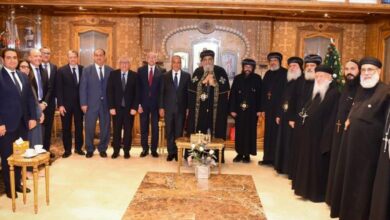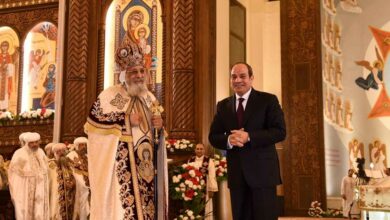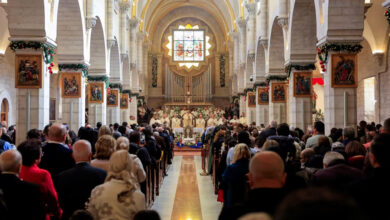As the eve of Coptic Christian celebrations approaches, reluctance to attend churches increases amid fears of a repeat bomb terror attack.
A suicide bomber attacked Alexandria’s Church of Two Saints early on Saturday claiming 23 lives and injuring dozens more. According to official statistics, Copts–the vast majority of Egyptian Christians–represent around ten percent of Egypt’s population.
“I will attend the mass next Thursday evening. Nothing can sever my relationship with God,” said Maged Nessim, the Coptic owner of a jewelry store.
“Why did security permit vehicles to park in front of the church despite repeated threats by Al-Qaeda?” Nessim questioned. “If the government had imposed tight security measures in the first place, this massacre wouldn’t have taken place.”
Saad Mekhael, a Coptic vendor, also placed responsibility on the regime, saying, “I am disappointed by the violation of Christians’ rights in Egypt, while the government is turning a blind eye to religious persecution.”
“I am still hesitating whether to go to church this year or not,” he said. For Mekhael the government’s statements are merely words that have lost their credibility after consecutive attacks on Christians during the past period.
Madeline Aziz, a Coptic student, ruled out the possibility that Egyptian Muslims were behind this violent attack, saying, “I have grown up with my Muslim friends and neighbors and I can’t believe that Egyptian Muslims are involved in this incident.”
She believes that there were foreign elements behind the bombing, which she views as a conspiracy to destroy national unity and encourage an eruption of civil war in Egypt.
Al-Qaeda is suspected in the bombing due to its recent threats to attack Egypt’s Christian institutions if two Egyptian women who allegedly converted to Islam are not released from their alleged detention in monasteries.
The threats followed the siege of a Catholic church in Baghdad by the Islamic State of Iraq gunmen last November.
Mekhael however disagreed with Aziz, saying that it makes no difference to Christians if Al-Qaeda or Israel was the attacker; the result is the same at the end, which is that Copts do not feel secure in their own home.
“We (Copts) cannot remain silent on this suppression. Protests will end up in vain as long as the government shows indifference and unwillingness to secure Christians,” said Adel Mina, a Coptic banker.
Demonstrations have been staged across Egypt since Sunday against the incompetent security around churches.
On Monday, more than 6000 Copts in the Shubra district of Cairo protested the attack. During the protest violent clashes broke out between protesters and security apparatus.
Mina added that human right organizations as well as the US have to take positive action against the suppression Copts are suffering from. “Pope Shenouda III has to express his anger and interfere to stop this charade with its serious consequences,” he added.
Egypt’s Pope Shenouda III, the patriarch of the Coptic Orthodox church, announced on Sunday that he will not cancel Coptic Christmas mass on the night of 6 January, explaining that cancellation will not solve the problem. However, in an interview on state-run television, Shenouda urged the regime to find a satisfactory solution to Coptic grievances.
Last Tuesday, twelve Egyptian rights organizations called on the government to follow an effective policy that tackles sectarian issues, including violence and extremism.
Mina said he was not going to church this year, fearing for his family's safety.
However, Aziz has decided to celebrate Christmas Eve and go to Church: “I won’t let anything ruin my happiness. Jesus will protect us,” she told Al-Masry Al-Youm.
“Two of my Muslim friends will participate in the human shield if it is going to be created around churches.”
Mohamed Abdel Moneim al-Sawy, founder of the Sawy Culturewheel, has taken the initiative in calling on Muslims to create human shields around churches on Coptic Christmas Eve to maintain Egypt’s national unity. In addition, more than 2000 Al-Azhar students organized a protest last Tuesday in solidarity with Copts.
“The regime cannot persist in ignoring the escalating sectarian strife. National unity is only an illusion faked by the state’s officials to conceal the deteriorating situation between Muslims and Copts,” said Nessim.




